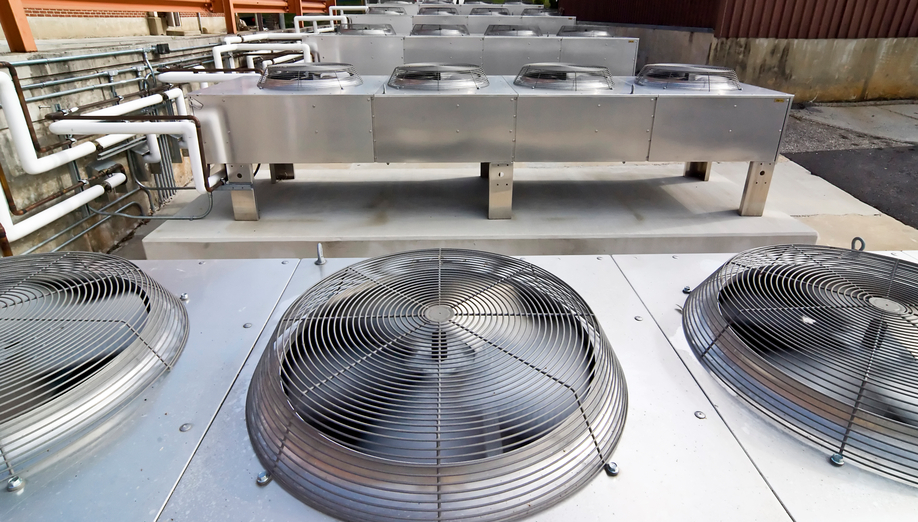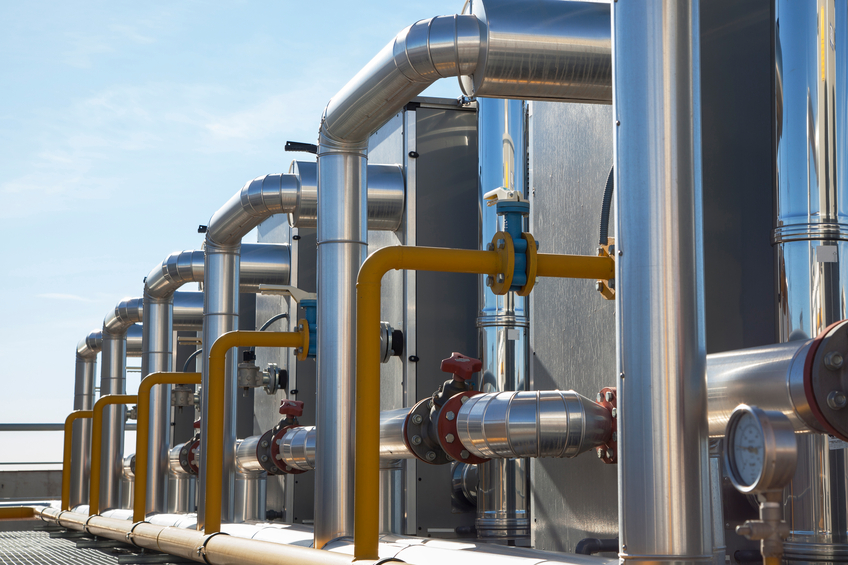Newfoundland and Labrador HVAC & Ethics/Regulatory 30 PDH Discount Package 2
Courses in this Package
Heat Rejection Options in HVAC Systems (M04-029)
Alternatives to Active HVAC Systems (M06-016)
Battery Room Ventilation and Safety (M05-021)
HVAC Design for Oil and Gas Facilities (M04-014)
Boiler Basics, Operation and Maintenance (M08-009)
General Principles of Engineering Ethics and Statutes for Newfoundland and Labrador Professional Engineers (NL3-001)

This online engineering PDH course provides a comprehensive description of the five prominent heat rejection methods as applicable to air conditioning systems.
One of the basic requirements of the air conditioning and refrigeration systems is to reject heat to the outdoors. Air conditioning chillers come in two different forms:
- An air-cooled chiller uses the flow of outside air across the condenser to remove or reject heat from the chiller. Air-cooled chillers typically have the condenser mounted on the roof or somewhere outside the facility while the evaporator can either be inside or outside the facility.
- Water-cooled chillers are typically 100 tons or greater and use water to remove the heat from the condenser. Water-cooled chillers are typically more efficient than air-cooled chillers. The condenser water is kept cool by a cooling tower, or water from the city main or well water is used. A water-cooled chiller will typically have the condenser and evaporator inside a facility while the cooling tower is located outside.
The range of chillers and associated heat rejection equipment is wide ranging.
This 4 PDH online course is applicable to architects, air-conditioning engineers, controls engineers, contractors, environmentalists, energy auditors and loss prevention professionals.
This P.Eng. continuing education course is intended to provide you with the following specific knowledge and skills:
- The concept of total heat of rejection (THR), its derivation and how it applies to the process of air conditioning
- Five prominent methods of heat rejection
- Importance of sub-cooling and super-heat in air-cooled condensers
- Types, rating and selection of air cooled condensers
- Operating principle of wet cooling towers
- Types of cooling towers, cross-flow, counter-flow, induced draft and forced draft
- Capacity control of air cooled and water cooled systems
- Closed circuit fluid coolers v/s evaporative condensers
- Energy performance of air-cooled chiller v/s water cooled systems
- Effectiveness of adiabatic cooling technology
- Benefits and limitations of various heat rejection methods
- The selection of appropriate method on capital costs and environment criteria
In this professional engineering CEU course, you need to review the document titled, “Heat Rejection Options in HVAC Systems”.
Upon successful completion of the quiz, print your Certificate of Completion instantly. (Note: if you are paying by check or money order, you will be able to print it after we receive your payment.) For your convenience, we will also email it to you. Please note that you can log in to your account at any time to access and print your Certificate of Completion.

This online engineering PDH course presents passive cooling systems which provide guidelines on choosing the proper technologies suitable to different situations.
Buildings are major consumers of energy insofar as their construction, operation and maintenance are concerned. It is estimated that almost 50% of the global energy demand is due to buildings with active HVAC equipment being the highest contributor. Thus, the energy conscious architecture has evolved to address these issues. It involves the use of eco-friendly and less energy intensive building materials, incorporation of passive cooling techniques in building design and integration of renewable energy technologies.
Passive cooling methods maximize the efficiency of the building envelope by minimizing heat gain from the external environment and facilitate cooling by air movement, ventilation, night cooling, evaporation, desiccant dehumidification and earth coupling to name a few. All these techniques require little or no input of electrical energy. Even when these alternatives cannot avoid the use of compressive cooling systems completely, their role can optimize the energy consumption and the peak electric load.
This 6 PDH online course is aimed at students, mechanical engineers, architects, facility managers, environmentalists, energy auditors and anyone interested in gaining a basic understanding of cooling systems.
This P.Eng. continuing education course is intended to provide you with the following specific knowledge and skills:
- Understanding the factors having greatest impact on summer cooling loads
- Understanding the mechanisms of heat gain control by intervening solar radiation, vegetation, ventilation and internal heat gains
- Learning the principles of natural ventilation design in night cooling
- Understanding the design factors for stack and wind driven ventilation
- Learning the basic principles of direct and indirect evaporative cooling systems
- Understanding the factors affecting evaporation rate and cooling
- Learning the principles of desiccant cooling and dehumidification
- Knowing the performance of an absorption chiller system v/s vapor compression cycle
- Understanding the various radiant cooling strategies
- Understanding the fundamentals of direct ground cooling systems and geothermal heat pumps
In this professional engineering CEU course, you need to review the course document titled, "Alternatives to Active HVAC Systems".
Upon successful completion of the quiz, print your Certificate of Completion instantly. (Note: if you are paying by check or money order, you will be able to print it after we receive your payment.) For your convenience, we will also email it to you. Please note that you can log in to your account at any time to access and print your Certificate of Completion.

This online engineering PDH course describes the hazards associated with batteries and highlights those safety features that must be taken into consideration when designing, constructing and fitting out a battery room. It is only for reference and anyone using this course should rely on state and local codes that may apply. Advice on specific ventilation rates required must be sought from the battery suppliers.
It is common knowledge that lead-acid batteries release hydrogen gas that can be potentially explosive. The battery rooms must be adequately ventilated to prohibit the build-up of hydrogen gas. During normal operations, off gassing of the batteries is relatively small. However, the concern is elevated during times of heavy recharge of the batteries, which occur immediately following a rapid and deep discharge.
Often the worst case scenario for dangerous hydrogen accumulation is underestimated. But dismissing such a critical safety issue is not a safe or responsible way to deal with it. Instead, engineers should be prepared to face the likely possibility of hydrogen build up, clearly identify the conditions when the risk is highest, and design systems that protect us from explosive levels in a fail-safe way.
This 5 PDH online course is intended for HVAC designers,architects, loss prevention engineers, facility maintenance personnel, environmentalists, energy auditors as well as consultants and contractorsinterested in gaining an understanding of cost effective ventilation.
This P.Eng. continuing education course is intended to provide you with the following specific knowledge and skills:
- Describing the construction, function and operation of a Lead Acid battery
- Defining battery capacity i.e. ‘Amp Hour Rate’ or ‘Reserve Capacity’ voltage
- Explaining the differences between vented lead acid and sealed VRLA batteries
- Explaining the rules and regulations provided by IEEE, OSHA, NEC, UBC and DOT
- Determining the ventilation requirements for a battery room for hydrogen and fume extraction
- Describing the battery maintenance, testing and charging practices
- Describing the dangers and the Health and Safety precautions associated with the lead acid battery, its service, as well as its use and component materials
In this professional engineering CEU course, you need to review the course document titled, “Battery Room Ventilation and Safety”.
Once you complete your course review, you need to take a multiple-choice quiz consisting of twenty five (25) questions to earn 5 PDH credits. The quiz will be based on this course document.
Upon successful completion of the quiz, print your Certificate of Completion instantly. (Note: if you are paying by check or money order, you will be able to print it after we receive your payment.) For your convenience, we will also email it to you. Please note that you can log in to your account at any time to access and print your Certificate of Completion.

This online engineering PDH course will help explain the complexities of HVAC design for offshore installations and how to go about carrying out the selection of a proper system and related equipment.
Oil & Gas (O&G) facilities are fraught with numerous challenges related to health and safety, logistics, economics, quality assurance and overall performance. HVAC design for such facilities needs special considerations not only to minimize the potential loss to capital investment but also to isolate the personnel from life-threatening environment. The main objectives of HVAC systems in O&G facilities include:
- Maintain acceptable working and living environment for personnel and non - destructive conditions for equipment.
- Prevent ingress of potentially explosive/toxic gas-air mixtures into non-hazardous areas, electrical switch rooms and equipment rooms.
- Prevent formation of any combustible mixture and maintain an atmosphere where the gas/air mixture is kept below LEL during normal operation.
- Provide dilution ventilation for all enclosed hazardous areas in order to reduce the risk from build-up of potentially explosive/toxic gases within these spaces.
- Prevent smoke spreading and keep enclosed escape ways free of smoke in case of fire.
This 4 PDH online course is applicable to mechanical and HVAC engineers, process engineers, architects, building designers, contractors, energy auditors, facility managers who are involved in the design and installation of HVAC for oil and gas facilities.
This P.Eng. continuing education course is intended to provide you with the following specific knowledge and skills:
- Be aware of the critical design issues related to oil & gas facilities
- Understand how an offshore installation different from an onshore installation
- Understand the concept of area classification for hazardous locations
- Understand the importance of pressure differential between hazardous and non-hazardous areas.
- Understand the critical system parameters that must be controlled and monitored
- Understand the importance of dilution ventilation to mitigate the impacts of accidental releases of flammable and toxic gases
- Understand the concepts of air cleaning and filtration requirements
- Understand the requirements of blast proof intake and exhaust valves in line with structural requirements
- Understand the specifications of HVAC equipment and machinery suitable for saline corrosive atmosphere
- Understand the importance of commissioning and documentation
In this professional engineering CEU course, you need to review the course document titled "HVAC Design for Oil and Gas Facilities".
Upon successful completion of the quiz, print your Certificate of Completion instantly. (Note: if you are paying by check or money order, you will be able to print it after we receive your payment.) For your convenience, we will also email it to you. Please note that you can log in to your account at any time to access and print your Certificate of Completion.

This online engineering PDH course provides information on steam generation, types of boilers pertinent to engineering operations, and the various fittings and components commonly found on boilers.
The boiler is an enclosed vessel in which water is heated and circulated, either as hot water or steam, to produce a source for either heat or power. A central heating plant may have one or more boilers that use gas, oil, or coal as fuel. The steam generated is used to heat buildings, provide hot water, and provide steam for cleaning, sterilizing, cooking, and laundering operations. Small package boilers also provide steam and hot water for small buildings.
A boiler must also meet certain requirements before it is considered satisfactory for operation. The boiler must be safe and economical to operate, and it must be able to generate steam at the desired rate and pressure.
This 8 PDH online course is applicable to mechanical engineers and professionals who are interested in learning more about the operation, maintenance, and repair of boilers used in various engineering applications.
This P.Eng. continuing education course is intended to provide you with the following specific knowledge and skills:
- Familiarizing with the steam generation theory
- Understanding boiler design requirements
- Learning about the different types of boilers, their fittings and accessories
- Identifying the automatic controls associated with boilers
- Learning about the different types of instruments and meters
- Knowing the procedures associated with boiler water treatment and cleaning
- Gaining an overview of the procedures associated with boiler maintenance
Upon successful completion of the quiz, print your Certificate of Completion instantly. (Note: if you are paying by check or money order, you will be able to print it after we receive your payment.) For your convenience, we will also email it to you. Please note that you can log in to your account at any time to access and print your Certificate of Completion.

This online engineering PDH ethics course presents the principles of engineering ethics and statutes for Newfoundland and Labrador Professional Engineers.
Engineering ethics is (1) the study of moral issues and decisions confronting individuals and organizations involved in engineering and (2) the study of related questions about moral conduct, character, ideals and relationships of peoples and organizations involved in technological development (Martin and Schinzinger, Ethics in Engineering).
This course will address the principles of engineering ethics that every engineer is expected to live by when practicing their profession. This course also provides an overview of PEGNL’s general statutes and regulatory laws. It will also present unique ethical studies randomly selected to demonstrate ethical challenges for professional engineers and alternatives to address these challenges.
This 3 PDH online course is applicable to Professional Engineers licensed in Newfoundland and Labrador and who are required to demonstrate continuing professional competency in ethical practice and regulatory learning as a condition of their license renewal.
This online course is intended to provide you with the following specific knowledge and skills:
- Understanding the definition of engineering ethics
- Learning about the important principles of the Engineer’s Professional Responsibility
- Gaining a general overview on PEGNL’s procedure of filing an allegation, its resolution by Registrar and its referral to Complaints Authorization Committee (CAC)
- Familiarizing with PEGNL’s general statutes and regulatory laws
- Understanding professional ethical practices through presenting realistic case studies
Upon successful completion of the quiz, print your Certificate of Completion instantly. (Note: if you are paying by check or money order, you will be able to print it after we receive your payment.) For your convenience, we will also email it to you. Please note that you can log in to your account at any time to access and print your Certificate of Completion.